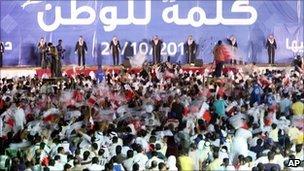Bahrain's Shia face tough election battle
- Published

A wave of arrests and regular protests have formed the background to the election
With a parliamentary election due in Bahrain this Saturday, the BBC's Crossing Continents reporter, Bill Law, looks at the struggle of the country's Shia majority for more powers from the Sunni-led rulers.
"We have no choice, no alternative but to take part. If we don't take part things will only get worse", says Bahraini MP Dr Jasim Husain.
Dr Husain is a member of the Shia political party Al-Wifaq. The party currently holds 17 seats in parliament.
For the majority Shia in the tiny Gulf state things have been difficult indeed.
A wave of arrests in August and treason charges against 23 leading Shia opposition figures have added to simmering resentment and the charge that the government has tried to silence its critics ahead of Saturday's vote.
That is a claim Justice Minister Sheikh Khalid Bin Ali Al Khalifa robustly denies.
"I can assure you [the arrests] have no relation to the election. We do not choose the time of a crime to happen, we do not choose who is going to commit it, how or when. This is a separate issue."
The 23 activists will go on trial on terrorism charges next week, accused of plotting to overthrow the government, partly through instigating street protests that have escalated in recent years with nightly tyre burnings.
'Worse off'
The minister says the vote is being run in a transparent fashion and that the elections are an important step on the road to an open and democratic society.
"The main issue is that we created a system of inclusivity. It doesn't matter what your sect is. We are always asserting we have to do our political dialogue under an umbrella of unifying the country," he says.
Critics point both to the arrests and continuing discrimination in jobs and housing as evidence that the country falls far short of achieving such an inclusive and democratic society.
Nabeel Rajab heads up the Bahrain Center for Human Rights. He says that most Shia are completely disillusioned. As a result, Mr Rajab expects a very low turnout.
"Those who participated in the 2006 elections thinking that their problems would be solved today see that they have lost ground. The reality is that Shia are worse off."
Mr Rajab cites research compiled by his organisation showing that the government is employing a third fewer Shia now than five years ago.
He says parliament has done nothing to alleviate rampant unemployment and poor housing in Shia communities.
"No laws have been introduced, let alone passed. Parliament has no real power. It all lies in the hands of the Khalifas [the royal family]."
Despite 2002 reforms which renamed the then-emirate a constitutional monarchy and restored the legislature dissolved in 1975, King Hamad's uncle, Sheikh Khalifa Bin Salman Al Khalifa, has served continuously as prime minister since independence from Britain in 1971.
The 2002 constitution was adopted in the wake of deadly unrest among the Shia majority through the 1990s.
Today, Shia are also angry about what they say is gerrymandering.
Al Wifaq's Jasim Husain says that the predominatly Sunni south of the island is heavily over-represented at the expense of the Shia north.
"We have tried to convince the government to do away with the practice," he says. "We hope it embarrasses them."
Critics also say that in some cases, Shia voters have been moved to Sunni areas where their votes have less impact.
But the justice minister brushed aside allegations of gerrymandering: "Any member of parliament represents the whole country, he does not represent an area, a sect or a race."
As far as many Shia are concerned, such statements fly in the face of reality.
Still, Nabeel Rajab says: "You have to go towards the light. The parliament has brought into the open discussion of subjects that used to be taboo. Information is being released about things like the amount of land the royal family owns."
In that sense at least Bahrain is edging forward on the democratic front.
Bill Law is a reporter with BBC Radio 4's award-winning foreign affairs documentary series, Crossing Continents.
- Published8 September 2010
- Published5 September 2010